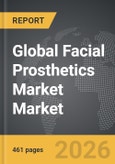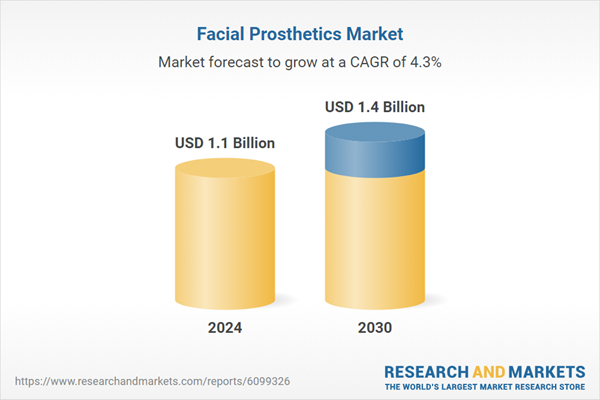Global Facial Prosthetics Market - Key Trends & Drivers Summarized
Why Are Facial Prosthetics Becoming a Transformational Solution in Reconstructive Medicine?
Facial prosthetics are increasingly recognized as life-enhancing solutions for patients requiring facial restoration due to trauma, congenital defects, surgery, or disease-related disfigurement. These custom-designed prosthetic devices help restore both appearance and function - addressing missing anatomical features such as noses, ears, eyes, or parts of the jaw - while significantly improving psychological well-being, social reintegration, and quality of life. With rising cases of skin cancers, road traffic accidents, and craniofacial surgeries, the global demand for facial prosthetics has grown steadily. Unlike traditional reconstructive surgery, which may involve complex procedures and multiple interventions, prosthetics offer a non-invasive, often more cost-effective alternative with shorter recovery times. Furthermore, prosthetics play a vital role for patients not suitable for surgery due to age, health complications, or economic constraints. Advances in imaging, impression techniques, and material science have made facial prosthetics more realistic, comfortable, and durable than ever before, helping reduce the stigma surrounding facial deformities and boosting patient confidence. As medical aesthetics continue to evolve, facial prosthetics are no longer solely a rehabilitative tool - they are an essential part of holistic patient-centered care that blends functionality with emotional healing.How Are 3D Printing and Digital Design Elevating the Precision and Personalization of Prosthetics?
The facial prosthetics market is undergoing a technological transformation, driven largely by the adoption of digital workflows and 3D printing technologies. Traditionally, prosthetic design was labor-intensive, relying on manual molds and artistic craftsmanship. Today, 3D scanning, CAD (Computer-Aided Design) software, and additive manufacturing have enabled the creation of hyper-realistic, precisely fitting facial prostheses tailored to each patient's anatomy. 3D imaging and printing streamline the entire design-to-delivery process, reducing lead times and allowing for better replication of skin texture, color, and anatomical symmetry. Implant-retained prosthetics, supported by osseointegrated titanium fixtures, are also benefiting from precision engineering, ensuring better attachment, stability, and patient comfort. Advanced medical-grade silicones and polymers are now being used to replicate natural skin tones and elasticity, with some even integrating micro-pigmentation and UV stability to maintain aesthetics over time. Digital color matching, combined with prosthetic painting techniques, further enhances the realism and longevity of facial prostheses. These innovations are not only improving clinical outcomes but also broadening access, as digital tools enable remote collaboration between clinicians and technicians, particularly in underserved or rural regions. The fusion of technology and artistry is setting new standards in prosthetic realism, reproducibility, and patient satisfaction.Which Patient Groups and Clinical Use Cases Are Expanding Market Demand?
The demand for facial prosthetics is expanding across a diverse range of clinical scenarios, age groups, and geographies. Oncology patients represent a significant segment, particularly those who have undergone surgical excision of facial structures due to skin cancers, head and neck tumors, or basal cell carcinomas. Trauma survivors - such as those affected by road accidents, warfare, or industrial injuries - also constitute a growing patient base seeking both functional and aesthetic rehabilitation. Congenital deformities, including microtia, cleft lip and palate, or craniofacial syndromes, are being increasingly managed with prosthetic interventions in pediatric and adolescent populations. Facial prosthetics are also used in cases of rare infections or autoimmune diseases that result in facial tissue loss. Elderly patients, who may be less ideal candidates for reconstructive surgery due to comorbidities, often opt for prosthetics as a less invasive alternative. Regionally, advanced healthcare systems in North America and Europe lead in adoption, driven by reimbursement frameworks, specialist centers, and innovation funding. However, emerging economies in Asia-Pacific and Latin America are experiencing rising demand due to increased access to healthcare, growing awareness, and philanthropic or government-supported prosthetic programs. These varied use cases are broadening the scope and significance of facial prosthetics in restorative medicine worldwide.What Are the Primary Factors Driving the Growth of the Global Facial Prosthetics Market?
The growth in the facial prosthetics market is driven by several factors related to medical need, technological progress, evolving patient demographics, and healthcare infrastructure expansion. A primary driver is the increasing incidence of trauma, cancer-related surgeries, and congenital facial conditions, which create sustained clinical demand for facial restoration. Technological innovations - especially in 3D imaging, digital design, and material development - are making prosthetics more accurate, lifelike, and patient-friendly, thereby improving adoption and outcomes. From an end-use perspective, the expansion of maxillofacial surgery units, rehabilitation centers, and specialized prosthodontics practices is enhancing accessibility to prosthetic care. Growing awareness about the psychosocial benefits of facial prosthetics is encouraging patients and clinicians to explore these solutions as part of comprehensive treatment plans. Additionally, improvements in insurance coverage, philanthropic funding, and public healthcare initiatives are reducing financial barriers in several regions. Increasing collaborations between prosthetic manufacturers, medical institutions, and academic research bodies are also fostering innovation and global dissemination. Regulatory support for medical devices and custom healthcare solutions is further enabling market entry and growth. These combined drivers are propelling the global facial prosthetics market forward, establishing it as a critical interface between restorative healthcare, digital innovation, and compassionate patient care.Report Scope
The report analyzes the Facial Prosthetics market, presented in terms of market value (US$). The analysis covers the key segments and geographic regions outlined below:- Segments: Type (Auricular Prosthetics, Nasal Prosthetics, Ocular-orbital Prosthetics, Maxillary & Midface Prosthetics); Method (Adhesive, Bone-Integrated Implants); Material (Plastic, Metals, Composites); End-Use (Hospitals, Cosmetic Clinics / Specialty Centers, Ambulatory Surgery Centers).
- Geographic Regions/Countries: World; United States; Canada; Japan; China; Europe (France; Germany; Italy; United Kingdom; Spain; Russia; and Rest of Europe); Asia-Pacific (Australia; India; South Korea; and Rest of Asia-Pacific); Latin America (Argentina; Brazil; Mexico; and Rest of Latin America); Middle East (Iran; Israel; Saudi Arabia; United Arab Emirates; and Rest of Middle East); and Africa.
Key Insights:
- Market Growth: Understand the significant growth trajectory of the Auricular Prosthetics segment, which is expected to reach US$607.7 Million by 2030 with a CAGR of a 4%. The Nasal Prosthetics segment is also set to grow at 3.6% CAGR over the analysis period.
- Regional Analysis: Gain insights into the U.S. market, valued at $301.5 Million in 2024, and China, forecasted to grow at an impressive 6.9% CAGR to reach $276.9 Million by 2030. Discover growth trends in other key regions, including Japan, Canada, Germany, and the Asia-Pacific.
Why You Should Buy This Report:
- Detailed Market Analysis: Access a thorough analysis of the Global Facial Prosthetics Market, covering all major geographic regions and market segments.
- Competitive Insights: Get an overview of the competitive landscape, including the market presence of major players across different geographies.
- Future Trends and Drivers: Understand the key trends and drivers shaping the future of the Global Facial Prosthetics Market.
- Actionable Insights: Benefit from actionable insights that can help you identify new revenue opportunities and make strategic business decisions.
Key Questions Answered:
- How is the Global Facial Prosthetics Market expected to evolve by 2030?
- What are the main drivers and restraints affecting the market?
- Which market segments will grow the most over the forecast period?
- How will market shares for different regions and segments change by 2030?
- Who are the leading players in the market, and what are their prospects?
Report Features:
- Comprehensive Market Data: Independent analysis of annual sales and market forecasts in US$ Million from 2024 to 2030.
- In-Depth Regional Analysis: Detailed insights into key markets, including the U.S., China, Japan, Canada, Europe, Asia-Pacific, Latin America, Middle East, and Africa.
- Company Profiles: Coverage of players such as Beiersdorf AG, Biotique, Bulldog Skincare, CeraVe, Cetaphil and more.
- Complimentary Updates: Receive free report updates for one year to keep you informed of the latest market developments.
Some of the 32 companies featured in this Facial Prosthetics market report include:
- Advanced Artificial Eyes
- Arm Dynamics
- Center for Prosthetic Restorations
- CM Prosthetics
- Custom Prosthetic Designs, Inc.
- Erickson Laboratories
- F. Ad. Müller Söhne GmbH & Co. KG
- Fillauer
- Hanger Clinic
- Medical Art Prosthetics
- Medical Art Resources
- Mobius Bionics
- Ocular Prosthetics, Inc.
- Ohio Willow Wood
- Össur
- Ottobock
- Prosthetics Advancement Lab
- RealLifeFaces
- Steeper Group
- Zimmer Biomet
This edition integrates the latest global trade and economic shifts into comprehensive market analysis. Key updates include:
- Tariff and Trade Impact: Insights into global tariff negotiations across 180+ countries, with analysis of supply chain turbulence, sourcing disruptions, and geographic realignment. Special focus on 2025 as a pivotal year for trade tensions, including updated perspectives on the Trump-era tariffs.
- Adjusted Forecasts and Analytics: Revised global and regional market forecasts through 2030, incorporating tariff effects, economic uncertainty, and structural changes in globalization. Includes historical analysis from 2015 to 2023.
- Strategic Market Dynamics: Evaluation of revised market prospects, regional outlooks, and key economic indicators such as population and urbanization trends.
- Innovation & Technology Trends: Latest developments in product and process innovation, emerging technologies, and key industry drivers shaping the competitive landscape.
- Competitive Intelligence: Updated global market share estimates for 2025, competitive positioning of major players (Strong/Active/Niche/Trivial), and refined focus on leading global brands and core players.
- Expert Insight & Commentary: Strategic analysis from economists, trade experts, and domain specialists to contextualize market shifts and identify emerging opportunities.
Table of Contents
Companies Mentioned (Partial List)
A selection of companies mentioned in this report includes, but is not limited to:
- Advanced Artificial Eyes
- Arm Dynamics
- Center for Prosthetic Restorations
- CM Prosthetics
- Custom Prosthetic Designs, Inc.
- Erickson Laboratories
- F. Ad. Müller Söhne GmbH & Co. KG
- Fillauer
- Hanger Clinic
- Medical Art Prosthetics
- Medical Art Resources
- Mobius Bionics
- Ocular Prosthetics, Inc.
- Ohio Willow Wood
- Össur
- Ottobock
- Prosthetics Advancement Lab
- RealLifeFaces
- Steeper Group
- Zimmer Biomet
Table Information
| Report Attribute | Details |
|---|---|
| No. of Pages | 461 |
| Published | February 2026 |
| Forecast Period | 2024 - 2030 |
| Estimated Market Value ( USD | $ 1.1 Billion |
| Forecasted Market Value ( USD | $ 1.4 Billion |
| Compound Annual Growth Rate | 4.3% |
| Regions Covered | Global |









